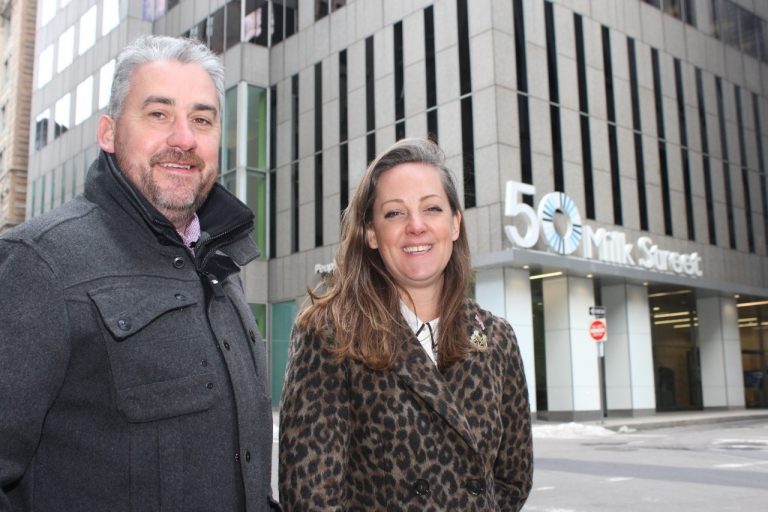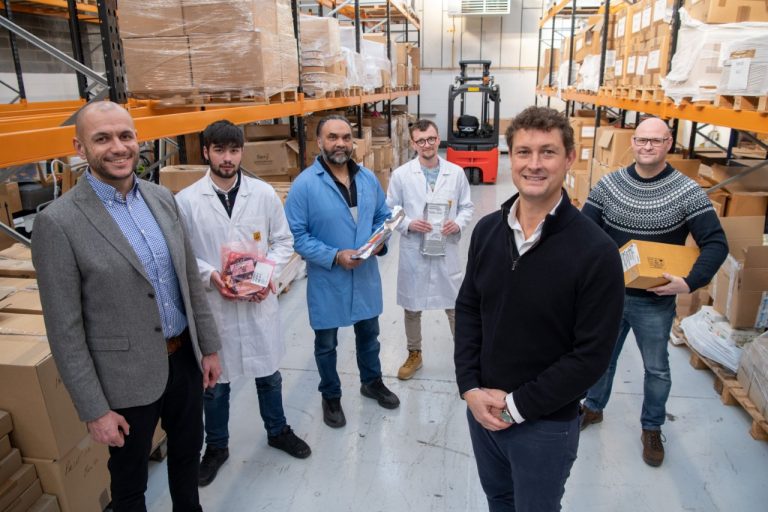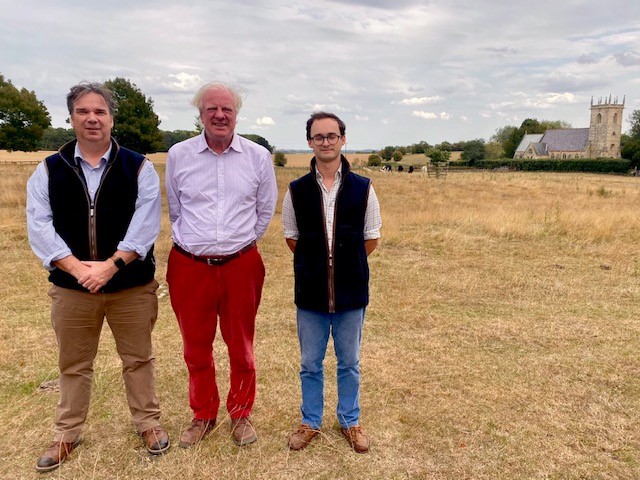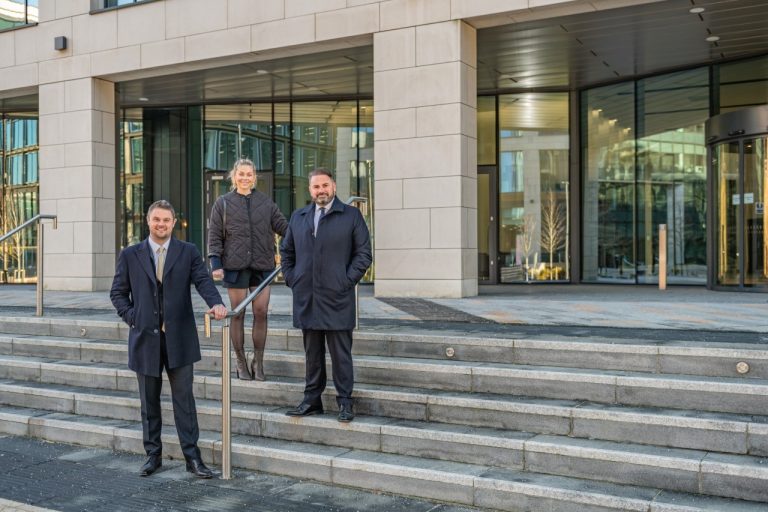Inseego makes tracks to South Central
The Leeds office of global property consultancy Knight Frank has brokered a significant deal at the South Central development in the city.
Inseego, a provider of fleet tracking software and business solutions, is taking of 5,000 sq ft of newly refurbished space at the 75,338 sq ft Shelborn development in Millshaw.
Inseego is relocating from Headingley.
Ian Holt, Managing Director (Finance and Operations) for Inseego, explained that this was an important move for the company.
“We can’t wait to move into our new state-of-the-art Leeds HQ. We looked at various offices across Leeds for our new premises and only South Central ticked all the boxes. The combination of its excellent location and first-class facilities, including ample car parking, was exactly what we wanted.
“South Central is close to the M621, M62 and M1, providing excellent access to Yorkshire’s motorway network, making it easy for our staff to get there by car. It is also close to the White Rose Shopping Centre and the new White Rose Train Station, which opens in the summer of 2023.
“All being well, we will start fitting out the new offices at the beginning of the second quarter of next year and will have moved in by the autumn.
“I’d like to thank Eamon Fox of Knight Frank for all his hard-work and efficiency in making this deal happen pretty seamlessly,” added Mr Holt.
Eamon Fox said: “The comprehensive refurbishment of South Central, formerly offices for Barclays Bank, will provide some of the finest office space in south Leeds. The Inseego deal is a resounding endorsement of what South Central has to offer and it is no surprise that we have another 5,000 sq ft of prime office space currently under offer to a global company.”
Panintelligence eyes US growth following £1m SaaS revenues in first full year on AWS
Panintelligence, the Leeds-based provider of business intelligence and predictive analytics tools, has announced the relaunch of its US office.
The move comes in the wake of the firm’s first full year offering its hosted software as a service (SaaS) product via the Amazon Web Services (AWS) Infrastructure, which has opened up a vast new potential market of SaaS customers globally.
The business, which had opened the doors of its Boston operation just a year before the pandemic, is relaunching its operations in the US three years after global travel restrictions sent its business there virtual. The move follows £1m of new revenues from Panintelligence’s cloud-based products in the firm’s first full year on AWS in 2022 with growth of 46% year on year.
“We’re a completely different business now than three years ago and we are now 100% focused on deployment in the cloud, and mainly via AWS. We are relaunching in the US to drive our sales in the biggest global market for our products,” said founder Zandra Moore.
The move was a major strategic pivot for the Leeds-based software business in direct response to a dramatic growth in demand for hosted services that has been triggered by the impact of the pandemic on the software market since 2020.
“Three years after we were forced to cancel our launch event in Boston on the eve of the global lockdown, we’re back in the US with a totally re-engineered business model and fantastic growth in our first year as a truly SaaS business,” she added.
The firm will mark its relaunch in the US with a high profile event hosted by the Department of International Trade in Boston on 3rd March, following a coast to coast programme of meetings with AWS and partner software vendors in San Francisco, New York and Boston.
“The move to SaaS was a sea change in the business and it enables software vendors and customers with smaller development resources and infrastructure to more rapidly integrate and use the Pi BI solution, enabling decisions to be based on real-time information from data already held by customers. It made the firm’s Pi software tools accessible to a new market of software vendors, and allows for faster potential growth in revenues,” added COO Charlotte Bailey.
The re-launch marks the culmination of a 30-month programme of product and service re-development in order to meet increasing global demand for its embedded dashboards, reporting and predictive analytics tools as a fully-hosted service.
COO Charlotte Bailey said: “Panintelligence’s mission has always been to democratise data and enable agility, and this move further opens up the value of insight to a whole new market of vendors and customers so that everyone, no matter what area of the business they work in, can access what they need in real time and truly become data-first companies.”
Panintelligence was founded by Ken Miller and CEO Zandra Moore in 2014 and employs a team of 43 staff at the company’s Leeds HQ.
Legal and General agrees £430m buy-in to Tioxide pension fund
Legal & General Assurance Society has agreed a £430 million buy-in with the Tioxide Pension Fund, securing the benefits of around 2,700 retirees and deferred members.
The sponsoring company, Venator Group (“the Sponsor”), is a leading global chemical company. The Fund is an existing Legal & General client, with Legal & General Investment Management (“LGIM”) having managed a proportion of the Scheme’s assets since 1995.
Legal & General was able to offer a tailored price lock solution that provided price certainty to the Trustee during a period of high market volatility while the terms of the buy-in were being agreed.
The Trustee and Sponsor appointed Aon as their specialist adviser for the transaction while legal advice was provided to the Trustee by Addleshaw Goddard. Clifford Chance provided legal advice to Legal & General.
Sally Roberts, Chair of Trustees, said: “We are very happy to have secured our members’ benefits fully through this transaction and achieve our long-term objective for the Fund. We appointed Aon as our specialist adviser for the transaction and we are grateful for the support of them and our advisers and the collaboration between the Trustee and Company to enable us to achieve this positive outcome for the Fund and our members.”
British Chambers of Commerce Director General joins board of ICC UK
The International Chamber of Commerce United Kingdom has appointed Shevaun Haviland (above) to its board.
As the Director General of the British Chambers of Commerce, Haviland’s local, national and international voice represents the BCC’s 53 Accredited Chambers in the UK and the tens of thousands of member businesses which employ close to six million people, as well as the almost 80 British Chambers of Commerce abroad, covering every continent in the world. Her expertise will now also be drawn on by ICC United Kingdom and the wider ICC network, with 45 million member companies in over 100 countries.
Before joining the BCC, Haviland spent five years in the Cabinet Office and No10 Downing Street managing business partnerships, including the launch of the Inclusive Economy Partnership. Prior to this, she spent 20 years working across business, spanning from digital start-ups to global corporate management.
Shevaun’s dual roles in the ICC United Kingdom and BCC will facilitate the sharing of expert insights and resources to accelerate both organisation’s vital work. With new opportunities for businesses of all shapes and sizes in 2023, this collaboration will help to align businesses’ domestic practice with their international outlook, bolstering resilience at home while taking full advantage of emerging overseas markets.
Paul Drechsler, Chair of the International Chamber of Commerce United Kingdom, said: “BCC member companies have demonstrated great resilience over the past few years and they welcome opportunities for international business growth. A major area of the ICC United Kingdom’s focus is technology enabled trade opening up more sustainable and cost-efficient processes to more businesses. Under Shevaun’s leadership, the BCC encompasses a diverse range of industries from all parts of the UK and I look forward to working with her on our shared international trade agenda.”
UK manufacturing output flat, but cost and price inflation ease to slowest pace since 2021
Cost and pricing pressures in UK manufacturing remain high, but shows signs of easing, according to the CBI’s latest Industrial Trends survey. In the quarter to January, average unit costs grew at the slowest pace since April 2021, while domestic selling price inflation was the slowest since July 2021. But both remained far above their long-run averages.
Manufacturers reported stable output volumes in the quarter to January, following a modest decline in the quarter to December. New orders were flat, while the volume of total order books fell further below normal, suggesting that output has been supported in part by manufacturers tackling backlogs of work. Looking ahead, manufacturers expect new orders and output volumes to increase in the next quarter, but the share of firms reporting that orders or sales would constrain output nonetheless reached its highest since April 2021.
The survey, based on the responses of 321 manufacturing firms, found that:
- Business sentiment fell for the fifth consecutive quarter, but at a much slower rate than in the three months to October (balance of -5%, from -48%). Export optimism also fell, but less quickly than in October, when it dropped at the fastest pace in two years (-22%, from -31%).
- Output volumes were stable in the quarter to January, after falling in the three months to December (weighted balance of -1% from -9%). Rising output in the mechanical engineering and food, drink & tobacco sub-sectors was offset by falls in chemicals, metal manufacturing and motor vehicles & transport equipment. Firms expect volumes to increase briskly in the next three months (+19%).
- Demand-side factors were seen as more likely to limit output in the next three months (57% of respondents cited orders or sales as a likely constraint, from 43% in October; average of 71%). Supply-side constraints remain historically significant, but have eased: shortages of skilled labour (38%, from 49%; average of 16%); shortages of materials/components (44%, from 54%; average of 11%).
- Total new orders were broadly stable in the quarter to January (balance of -3%, from -8%). However, the volume of total order books fell further below normal (balance of -17%, from -6% in October). Manufacturers expect new orders to rise over the next three months (+9%).
- Average costs growth remained exceptionally strong in the quarter to January, but nonetheless eased, with costs rising at the slowest pace since April 2021 (balance of +64%, from +82% in October; average of +17%). Cost growth is expected to slow further in the quarter to April (+53%).
- Average domestic selling price inflation also eased but remained elevated in the quarter to January (balance of +37%, from +50% in October; vs average of +2%). Domestic price inflation is expected to remain elevated over the next three months (+41%).
- Numbers employed continued to rise in the three months to January, albeit at a slower pace (+14%, from +26% in October). Firms expect headcount to rise further in the next three months (+24%).
- Investment intentions for the year ahead were mixed. Manufacturers expect to raise investment in training and retraining (+20%, from +14%), plant and machinery (+8%, from +6%) and product and process innovation (+6%, from +7%). Investment in buildings is expected to decline in the year ahead (-9% from -5%).
Wetherby risk management firm acquires Newcastle business
Wetherby-based Triton Risk Management Ltd has agreed to acquire Graspan Frankton Ltd, based in Newcastle. The acquisition creates a global leader in security, risk management and complex managed services for clients operating in high risk environments.
Graspan Frankton’s capabilities in complex security solutions combines with Triton Risk Management’s strength in the provision of risk management solutions for blue chip corporate clients.
A strong, well-financed platform for growth will help clients face increasingly complex challenges and risks. Graspan Frankton will help drive growth across the financial, energy, mining, maritime, oil & gas, petrochemical and infrastructure sectors, particularly in the Middle East and Africa.
Graspan Frankton’s management team remains unchanged.
Sean McKeown and Paul Manning, co-founders of Graspan Frankton, will continue to manage the business day-to-day, adding immeasurable value, insight, and relationships in the commercial markets they have established over the past decades.
Graspan chairman Paul Manning said: “Graspan Frankton’s clients face increasingly complex challenges in managing a myriad of risks including the safety of personnel, integrity of investments, regulatory compliance and the protection of corporate reputation. As a result, Graspan Frankton needs to offer more services, and this merger establishes a unique position for the company to meet these global operational demands.”
Sean McKeown, Graspan Frankton’s Managing Director, who will continue to lead Graspan Frankton, added: “With reputations for operational excellence and governance across government and commercial clients, not only will this combination allow each company to benefit from the other’s considerable experience, but it will provide us both with a broad and resilient platform for growth. We are tremendously excited about the opportunities which lie ahead for the combined Group.”
Ashley Wood, Managing Director of Triton Risk Management, said: “We are excited to welcome Graspan Frankton into the Triton family, the leadership, experience, and capabilities of our combined operations establish us as a full-service risk management, integrated security, and managed services provider with a global presence.”
Centrica plan green energy hub at former North Yorkshire gas power plant
A former gas fired power plant in North Yorkshire is to be turned into a green energy hub, under plans by Centrica.
The energy company has acquired the four-acre former Knapton Generating Station from Third Energy and plans to develop a 28MW battery on the site.
In addition, Centrica is exploring how Knapton could be used for off-grid hydrogen production, as well as the possibility for solar energy in the surrounding area.
The multi-million pound deal is part of Centrica Business Solutions’ strategic plan to create a 900MW portfolio of solar and battery assets by 2026.
The first project at the site near Malton will be a 56MWh battery which will utilise some of the 41.5MW export capability of the existing grid connection. It’s anticipated the battery would be able to power around 14,000 homes for two hours.
“Taking an old fossil fuel asset and revitalising it to help advance the decarbonisation of the grid not only feels the right thing to do from a sustainability point of view, but aligns with our strategy,” said Greg McKenna, Managing Director of Centrica Business Solutions. “We’re quickly acquiring a portfolio of assets that can play an important role in facilitating a net zero future for the UK.”
Gas production ended at the Knapton site in 2019 and the gas turbine and all gas processing equipment has been cleared, together with its housing shed and associated equipment being dismantled and removed. Third Energy will retain the ownership of the 12 well-sites and associated gas pipeline network.
Grimsby seafood business enters administration after abrupt plant closure
Cook & Lucas Frozen (UK) Limited has entered administration.
The company is an established importer, processor and supplier of seafood and whitefish, operating a smokehouse and processing plant in Grimsby.
On 10 January 2023, the company abruptly closed its plant in Grimsby, with approximately 80 members of staff being laid off. Following this unannounced closure, the company’s secured lender took steps to protect its position and sought the appointment of the joint administrators – James Clark and Howard Smith from Interpath Advisory.
James Clark, Managing Director at Interpath Advisory and joint administrator, said: “Given the circumstances surrounding our appointment, our immediate priority is to take steps to secure the company’s assets, while seeking to gather further information about the company’s financial position.”
Leeds-based semiconductor distributor celebrates 140% growth to £39m creating 20 new jobs as it eyes US market expansion
IC Blue, the Leeds-based global supplier of electronic components, is seeking another 20 linguists as the business continues to see significant international sales growth with revenues rising by over 139% in the last year alone.
Founded in 2003, IC Blue supports the electronic manufacturing industry with component sourcing, excess inventory management and design automation software. With its 5,000 sq ft European headquarters located in Neptune Street in Leeds city centre, it also has offices in Greece, Spain, Portugal and Hungary, and it established an EU zone shipping hub in the Netherlands three years ago.
The company, whose growth has been supported by Leeds City Council and Leeds City Region Local Enterprise Partnership (LEP), opened a 10,000 sq ft inspection and logistics facility in Holbeck, Leeds, in 2021, supported by a grant from the LEP’s Business Growth Programme, resulting in the creation of a further eight jobs.
The business, which is 80% export-based, has grown from a revenue of £7.9m in 2020, to £16.5m in 2021 and to £39.5m in 2022 – a rise of around 400% in the last three years. Its team has increased from 30 to 50 people and IC Blue is currently recruiting for another 20 Yorkshire-based linguists and support staff to help manage customer relationships globally. IC Blue currently has 20-plus different language speakers in-house, servicing over 900 customers across 50 countries.
“Having spotted a gap in the component distribution sector, we have been able to take advantage of Yorkshire’s heritage as a semiconductor cluster, based on Premier Farnell’s legacy, and established ourselves as a leading independent supplier across Europe,” explains Matthew Ward, director of IC Blue.
“Sitting between direct manufacturer supply and mainline distribution, we have shaken up traditional semiconductor supply chains by providing accountable procurement services, designed to meet the needs of mid-sized businesses, and a reliable route to realising value from excess components and reducing waste of precious metals and components.
“Our home in Leeds provides an ideal base, offering cost efficiencies over other regions as well as a pool of really talented, well-educated people looking for exciting career opportunities which enable them to stay in Yorkshire. We’re fortunate to have been supported by the Leeds City Council and the LEP, which recognised our potential to create more jobs for the region, and we’re now on the hunt for another 20 recruits to join our fast-growing team.”
He continues: “With just 30% of our sales currently coming from the US, but having seen 300% growth in the last 12 months, we believe this market is key and offers huge potential for further expansion – we will be actively growing our presence there over the next few years.”
IC Blue supplies a wide range of sectors from contract electronics manufacturers (CEM), industrial and automotive to defence and aerospace manufacturing.
With two other divisions providing excess inventory management and design automation software, since 2016, it has also been the sole distributor of Siemens PCB design and simulation software.
Hull City Council’s Cabinet backs new plans to regenerate Western Docklands
Hull City Council’s Cabinet has announced its support for the Western Docklands Masterplan, giving the green light to consultation with residents and business owners on the exciting plans.
The Western Docklands area lies between Albert and William Wright Dock, Castle Street and the Smith & Nephew site.
This masterplan suggests a range of different uses for the site, with a strong focus on employment land to the west, and residential/commercial and leisure land to the east.
The council wants to know the views of Hull residents, as well as local businesses in the area.
A six-week consultation will begin on Monday 6 February and run until Friday 17 March.
The plans also seek views on the future of the Hull Ice Arena and Kingston Retail Park.
Local businesses, residents and the wider public will all be invited to take part through a series of in-person drop-in sessions and an online survey.
The masterplan also sets out how it could create a better link to the marina and Fruit Market area.
The proposals also include a cruise terminal for the Western Docklands.
Sammy’s Point was originally earmarked as the location for this, but it is now proposed that the terminal be located at the Bull Nose at the eastern end of Albert Dock.
Councillor Paul Drake-Davis, Portfolio Holder for Regeneration, said: “The Western Docklands is a key landmark location within the city, being beside the waterfront, but also being the gateway for people driving into the city.
“It’s a site with enormous potential and the masterplan provides a clear framework for how the site could offer high-quality city living and employment in the years ahead.
“I support the masterplan and look forward to hearing the views of landowners, businesses and residents across the city on how they would like to see the area develop.”
More information, such as interactive maps and forums, plus the chance for the public to have their say, will be available online. Posters about the Western Docklands Masterplan will be placed in various locations in Hull, with a QR code for the online consultation.
Any responses to this consultation will be considered by the council in drafting a final version of the masterplan, which will then be presented to Cabinet later this year.
Group says Lincolnshire solar farm proposals totally unsuitable for area as valuable farmland to be decimated
The 7,000 Acres Group, a collection of residents from villages between Lincoln and Gainsborough, are campaigning to raise awareness of solar farm proposals in the area, highlighting issues associated with their development:
There are plans to develop over 7,000 acres of land in the area between Lincoln and Gainsborough, on productive farmland. Three industrial-sized solar farms are currently in formal planning.
The two companies involved, Island Green Power and Low Carbon, are proposing to build these projects and once finished, they will each be larger than the largest solar farm development in Europe.
A fourth solar farm is also being proposed by Tillbridge Solar, pushing to total land area to be used towards 10,000 acres mark. These developments will impact over 30 villages in the area.
The reason that these proposals are so large lies, in part, with the fact that solar power has such a low power density – i.e. it takes a huge amount of space to produce energy, which makes it a very inefficient use of land, particularly where there are important competing demands for its use, such as agriculture.
In addition, it may seem obvious, but solar gain in the UK is relatively low; this is the amount of energy that can be captured from the sun. Solar at this scale is being developed in India, China, Egypt and the United Arab Emirates – places which have over double the solar gain, so each panel will produce twice the electricity of a panel in Lincolnshire.
Despite the headline “power ratings” of 500MW to 600MW for these solar schemes, in the UK the average output from solar is around 11% of these figures (according to UK Government statistics), so the 4 proposed schemes potentially have a total headline power output of around 2000MW, but they would only provide 220MW over a year. For comparison, that is less than half one of the 8 generating units at the closing Cottam and West Burton Power Station sites, where the proposed schemes would connect to the National Grid – yet the solar schemes would use around 20 times the land of the old power stations.
Solar power generation provides a sharp peak of output when the sun is at its strongest, in the summer, in the middle of the day, when there is no cloud cover. Without means of storing excess energy in summer for use in winter evenings, the schemes will contribute little to Britain’s energy mix – and nothing when the country is most hungry for power, despite the vast amount of land they will consume.
These developments are being designated as Nationally Significant Infrastructure Projects, bypassing local planning laws and taking the planning decision out of the hands of local government, who are best placed to see the impact on local communities.
The 7,000 Acres Group is a collection of residents from more than 30 villages in the area that have come together to raise awareness of the scale of these projects and to put forward the argument that the proposed developments are totally unsuitable for the area, as well as for the country’s needs.
The Group are not against renewable energy projects, as they are well aware that energy security and reduction in carbon emissions are key to a sustainable planet. The Group are concerned that the proposed developments are taking up valuable farmland (Grade 3b and above), reducing our ability to provide food security for thousands of people.
There is also the consideration that the production and transportation of the solar panels and equipment will create a substantial carbon footprint before these projects are built. Covering our countryside with vast quantities of plastic, glass, metal and batteries is not “Levelling up the Nation.”
The Group agrees with the UK Government, that a much more suitable approach to developments of this nature is that they are built on brownfield sites – in line with current guidelines.
The Group does not understand why, in the name of the environment, thousands of acres of countryside could be covered with solar panels, when only around 3% of the UK’s households have solar panels fitted. Planning must change – to promote the installation on domestic and commercial rooftops, as a priority. There are a number of residential housing developments being built in the Gainsborough area, not one has made provision for solar panels to be installed on the roofs of these ‘new-build’ properties.
Whilst the construction of these solar farms will require a considerable labour, the ongoing operation of these developments requires very little human interaction. Long-term job creation for these schemes is minimal, with many local farm workers at risk of losing their jobs as the farmland is taken over. The local community will receive very little in terms of community gain, in contrast to the hundreds of millions of pounds going into the pockets of investors.
The 7,000 Acres Group will be campaigning to build up local awareness of these solar farm proposals and highlight the issues associated with their development.
The Group also notes the actions of the ‘No Solar Desert’ campaign in raising the issues to the local community, and we welcome the recent announcement that a 616 acre development by Island Green Power for West Burton 4 site near Retford has been withdrawn.
The basis of the withdrawal seems to be that the original assessment of land quality for agricultural designation was flawed and deemed to be wholly wrong. We believe this shows that we should challenge the assumptions and processes employed by the developers in selecting the remaining proposed sites, as those too may be flawed. The 7000 Acres Group continues to oppose the remaining proposals affecting around 30 villages between Gainsborough and Lincoln.
New headquarters for Mackenzie Stuart at Leeds’ Wellington Place
Mackenzie Stuart, a global executive search firm, has chosen urban quarter Wellington Place as its new corporate headquarters. The business will be moving into 6 Wellington Place in February 2023, with fit-out having already begun in its 12,000 sq ft Grade A office space.
Mackenzie Stuart has been headquartered in Leeds since it was established in 2005. With ambitions to become a £50 million turnover business by 2026, Mackenzie Stuart has decided to relocate to a larger space at Wellington Place to both accommodate its growth and create a more dynamic and engaging workspace.
With a focus on creating a balance between work and social space, 7,500 sq ft of office space will include meeting rooms, quiet pods, video conferencing spaces, co-working space and private offices, while a further 4,500 sq ft will be social space providing a yoga studio, golf simulator, pool tables, casual dining areas and chill-out areas.
Will Peeke-Vout, director at Mackenzie Stuart, said: “We knew that to deliver our ambitious growth plans and business objectives, we would need not only a significantly larger office space, but one that engaged our current employees and helped us continue to attract a high calibre of talent.
“Our new office at Wellington Place will provide us with an amazing combination of modern workspace and inspirational social space that will do just that, and we are extremely grateful to our partners at Design Tonic for turning our vision into a reality.”
Relocating from a short distance away at Whitehall Riverside where Mackenzie Stuart have been based for 10 years, Nichola Howarth, director stated: “We are proud of our northern roots and heritage, and when we were looking for a new base in the city, Wellington Place instantly stood out as a destination that would help us achieve our workplace vision.
“Not only is the office space at Wellington Place fantastic, its location and ethos are also second to none. There are lots of great restaurants and bars on our doorstep and the business community spirit from across the development is incredible. We can’t wait to join them and move into our new home.”
The Mackenzie Stuart Group of companies now occupies over 45,000 sq ft of office space across Leeds, London, Harrogate and Dubai.
Dominic Paglia, Group Managing Director said: “Mackenzie Stuart Group have delivered exceptional growth since our inception in 2005 and today we are a £26 million+ turnover business that employs over 250 employees in five locations across the UK and internationally. We have very ambitious growth plans and Wellington Place is the perfect location for us to continue our success story.”
Paul Pavia, commercial director at MEPC, the developer and asset manager behind Wellington Place, said: “Mackenzie Stuart is a fantastic business success story that’s evolved in Leeds, so we’re so pleased they have chosen Wellington Place as the destination to continue this growth. Their desire to create a workspace that places emphasis on a balance between work and social aligns exactly with what Wellington Place stands for.
“We pride ourselves on our high-quality, flexible office spaces that organisations can truly make their own to boost productivity and creativity, as well as wide range of activities and events, from running clubs to history talks, not to mention the great range of bars, restaurants and cafes. We’re looking forward to welcoming Mackenzie Stuart into our community.”
The agent letting for Wellington Place was JLL.
Wellington Place is a business community being built in central Leeds. Once complete, the scheme will have a total of 1.5 million sq ft of commercial, retail, leisure and residential space and be one of the biggest new city centre business quarters in Europe.
£4m investment boost for BRC Manufacturing
BRC Manufacturing, the supplier of steel reinforcement and associated products for concrete, is investing £4m into their site at Barugh Green.
The works, scheduled to be complete in May 2023, include a new automatic wire mesh line, which will improve the site’s capacity by 65%, increase tonnage by 45,000 and help improve throughput by 50%.
The investment will replace some machinery up to 40 years old with fully digital automated robotic lines to help provide laser-guided AI options to help improve productivity and visualisation.
In addition to this work, they have planted several trees at their site as part of their Environmental, Social and Governance (ESG) goals. The Mayor of Barnsley, Councillor Sarah-Jane Tattersall, was given a site tour last week.
Councillor Robert Frost, Cabinet spokesperson for Regeneration and Culture, said: “It’s excellent news for Barnsley that BRC Manufacturing is making this significant investment into their site at Barugh Green.
“It is a big commitment to the borough and shows that Barnsley is a great place for manufacturing businesses to operate and grow.
“I wish BRC the best of luck and continued success moving forward.”
Paul Mason, operation manager at BRC Manufacturing, added: “We have exciting and challenging times preparing the facility for the new machines coming later this year.
“It’s a great opportunity for everyone at BRC to be involved in the project and work with the most current, up-to-date mesh welding and cold rolling line machines.
“We will increase the workforce as we move to a three-shift plan towards the end of the year.
“While health and safety and improving our factory to create a safe workplace where employee welfare is our top priority, we also want to create a greener factory environment. In addition to the fact that 98% of our product is made using recycled materials, we have also planted 133 trees on site to reduce our carbon footprint.”
UK sugar beet farmers get green light for limited pesticide use
Defra has approved an emergency temporary authorisation for the use of a neonicotinoid pesticides on this year’s sugar beet crop to protect UK production after an estimated £67m was lost because of aphids last year.
Emerging sugar beet seedlings are vulnerable to predation from aphids that have the potential to spread beet yellows virus, which can severely affect sugar beet yield and quality. In 2020, 25% of the national sugar beet crop was lost, costing £67m of total economic loss across an industry that creates nearly 10,000 jobs.
Defra has attached strict conditions to the emergency authorisation including allowing for application only if independent modelling predicts a virus incidence of 63% or above. If the virus threshold is not met, then the neonicotinoid treated seed will not be used.
If the threshold is met and limited use is allowed, then further strict conditions will be applied to minimise risks to the environment. This includes a maximum number of seeds planted per hectare and restrictions on farmers planting flowering crops in subsequent years in any field where treated seed has been used. This is to allow time for the chemical to break down.
Emergency authorisations for pesticides are only granted for a short period of time, in special circumstances where it is necessary because of a danger that cannot be contained by any other reasonable means, and the use is limited and controlled. Other pesticide and organic treatments are not sufficiently effective in controlling the virus
The overall ban on the use of neonicotinoid pesticides remains in place.
Farming Minister Mark Spencer said: “We recognise the potential danger of an outbreak of the beet yellows virus on the nation’s sugar beet crop and the impact it could have on the production of UK sugar. Therefore after careful consideration, we regard issuing an emergency authorisation as a necessary measure to protect the industry. The product can only be used if a strict threshold is met and on a single non-flowering crop. This decision has not been taken lightly and is based on extensive and rigorous scientific assessment.”
Renewables giant gets involved with Fishing for Litter project to clean up the sea
Wind energy producer Ørsted has made a long-term commitment to help tackle the amount of marine litter in our seas. Working closely with the fishing industry, Ørsted has established Fishing for Litter projects at ports Grimsby, Cromer, Kings Lynn, East Runton and Boston – with ambitions to expand the project across the English coast.
Fishing for Litter, run by KIMO UK, works with the fishing industry to reduce the amount of plastic pollution and marine litter in the sea and washing up on our beaches.
Participating fishing vessels are given hardwearing bags to collect marine litter that is passively caught during fishing activities. Full bags of litter can then be taken ashore for disposal in dedicated skips. The project provides the bags, skips, and covers the waste disposal costs. Participating fishers, and any harbour staff who support the initiative, help to facilitate the disposal of marine litter and volunteer their time. Ørsted’s Fishing Industry Representatives, who have well established and often long-term relationships with fishers working within the vicinity of Ørsted’s offshore wind farm projects, act as liaison officers for the Fishing for Litter project.
Working alongside the fishing community and industry bodies, Ørsted’s Fisheries Stakeholder Team designed and circulated a questionnaire to obtain a better understanding of marine litter pollution and identify the best practical solution for fishers. Circulated by the National Federation of Fishermen’s Organisation (NFFO) and Holderness Fishing Industry Group (HFIG), the surveys evidenced that the provision of bins and skips at local ports would be the preferred solution to tackling the problem of marine litter.
Ørsted’s Hornsea 3 offshore wind farm has committed to funding Fishing for Litter disposal facilities at up to six ports along the east of England for the approximately 30-year life of the project. In making this long-term commitment, Hornsea 3 hopes to contribute to the permanent establishment of Fishing for Litter and provide fishers with the facilities to remove litter from the marine environment and encourage environmental restoration. Ørsted continues to expand its support of Fishing for Litter and is working to set up disposal facilities along the west coast of England and north into Yorkshire. Ørsted is also investigating potential options for the recycling of the marine litter disposed in the provided skips.
Lara Leonard, Commercial Fisheries Manager at Ørsted, said: “Our aim is to provide long term action and to work alongside fishing communities to help them be at the forefront of the fight against marine litter. Over the past couple of years, we’ve been engaging directly with fishers and fishing organisations to make sure that we can facilitate an effective and functional solution which works for them. Our main focus is to aid and empower fishers to make a difference, while also building on the positive relations with the fishing community who work within or near to our wind farm sites.”
Creative businesses offered share in funding worth £1.3m
Creative businesses in Greater Lincolnshire can now apply for a free programme of support to accelerate business growth, create jobs, and prepare for investment.
Businesses from architects to photographers and crafts designers to publishers can now bid to East Midlands Creative Consortium for a share in more than £1.3 million of Government funding.
Led by the Leicester and Leicestershire Enterprise Partnership, the consortium provided one of six successful regional bids for the Government’s Create Growth Programme.
Andy Reed OBE, LLEP Co-Chair, said: “The creative sector has created almost 4,000 jobs since 2010 in Leicester and Leicestershire alone. The vast majority of those jobs are in microbusinesses and Create Growth will help these high-potential employers to scale up.”
EMC² has commenced its regional project across Greater Lincolnshire, Leicestershire, Derbyshire, and Rutland, and it is backed by a coalition of partners including regional universities, Innovate UK, local businesses, and non-profit organisations.
The EMC² website is now live and accepting applications from local creative organisations. The programme starts in the Spring and runs to 2025.
It aims to support 100 creative businesses in four cohort groups across the three years. Around 50 creative organisations have already made early-stage expressions of interest.
Since funding was confirmed by the Department for Digital, Culture, Media and Sport, the LLEP has been working with partners to develop a delivery plan that meets the specific needs of local creative businesses. It will offer bespoke business support and investor outreach activities.
Applicants will also gain the opportunity to go on and apply for finance support from a £7m Government fund delivered by InnovateUK.
Creative industries are worth more than £100 billion to the UK economy and account for 2.3 million jobs.
Helen Donnellan, PVC Regional Business and Innovation, said: “The Create Growth fund has the potential to transform the creative sector by supporting ambitious businesses to scale up their business in the region.
“We already have one of the largest creative clusters outside of London but as Andy says, many of these are microbusinesses and this fund will help them to grow, creating more jobs and creating a thriving creative centre here. We’d encourage creative businesses to apply for this funding and not miss this opportunity.”
Poultry producers share severity of industry challenges with MPs
While Ministers were gearing up for their first week back in the House of Commons, the NFU Poultry Board were only a few doors down, taking questions from MPs and Peers across the political spectrum.
More than 25 parliamentarians attended the event, including Farming Minister Mark Spencer, and Shadow Farming Minister Daniel Zeichner.
MPs arrived armed with questions and the board members were ready to provide answers. All were keen to hear directly from farmers about the challenges poultry producers are currently facing, with AI (Avian Influenza), supply chain issues, energy and feed costs high on the agenda.
Poultry Board chair James Mottershead said:“The reception we had from MPs was ‘tell us more of these issues’ and ‘I didn’t know that, tell me how I can help’,” said James.
“It’s fantastic to have the opportunity to put forward potential solutions to some of our problems and they were well received.
“It was a big moment for me to be able to stand in front of the Farming Minister and Shadow Farming Minister as well as my own MP and tell them the severity of the challenges we’re facing, and what the repercussions of inaction could be.
“To other members I would say we all need to be treating MPs as major stakeholders within our businesses. When you explain the issues you face, they get it, which is why we should never be afraid to meet with our local MP so that they can understand the challenges and go on to represent us in parliament.”
Another two legal directors join Clarion’s real estate practice
Clarion’s expanding real estate practice, which is one of the largest in Yorkshire, has appointed another two legal directors to the team.
With over 20 years of real estate experience, Catherine Rhodes specialises in real estate finance and corporate support transactions. She acts for both landlords and tenants in relation to commercial leases as well as managing many large-scale corporate support transactions involving the sale or acquisition of extensive freehold and leasehold property portfolios.
Catherine works mostly for owner managed businesses, lenders and individuals in addition to large corporates, across sectors including retail, manufacturing and transport/logistics.
With substantial experience of dealing with complex matters for a wide range of clients, Lisa Stratford has been a specialist property litigator for over 12 years. She acts for investors and developers in an advisory and risk management capacity and is regularly instructed to deal with a wide range of property-related insolvency matters.
Lisa also has extensive portfolio management experience, acting for both landlords and tenants, including lease renewal and termination proceedings, dilapidations claims and rent and service charge disputes and recovery. She is also instructed in general property litigation matters such as those concerning easements, breach of covenant and nuisance.
Martin Grange, partner and head of Clarion’s real estate practice, said: “We’re really pleased to be welcoming two such experienced commercial property lawyers to the team – both Catherine and Lisa provide further strength in depth as we continue to provide real estate property advice to businesses across Yorkshire.
“It’s vital that we continue to invest in talent as, despite the current economic concerns, we are seeing resilience within the region and have a strong pipeline of work. Our dedicated property litigation team, led by Sophie Morley, is a team that is going from strength to strength.”
Catherine Rhodes said: “I’m excited to be joining one of the largest real estate teams in Yorkshire and one whose approach mirrors my own. Like Clarion, I believe it is vital to spend time getting to know a client’s business in detail and discussing exactly what their priorities are in order to deliver focussed and practical advice and establish a long-term relationship.”
Fellow legal director, Lisa Stratford added: “Clarion has a reputation for being a straight-talking, client-focussed firm and I’m looking forward to adding my skills to its excellent real estate practice. Providing no-nonsense, clear advice, in order to solve clients’ problems, is at the heart of what I do.”
Planning permission granted for Stacey West Stand development
Planning permission has been granted for Lincoln City Football Club’s development of the Stacey West Stand at the LNER Stadium.
This project will provide a range of infrastructure improvements to the LNER Stadium, including new power and mains water supplies as well as a pitch water recycling system.
Working closely with the Sports Grounds Safety Authority, the club have also submitted an application to trial safe-standing in a small section of the Stacey West Stand – with the intention of installing rail seats throughout the entire stand and into the GBM Stand should the trial be successful.
The project will create vital space for Lincoln City Foundation by providing a new Community Skills and Education Hub based at the stadium.
Building a new Community Skills and Education Hub will help tackle the growing skills gap in the city by providing the Foundation with a fit-for-purpose facility from which it can champion the delivery of education and employability skills, all under the brand of the football club.
Martin Hickerton, Chief Executive at the Foundation, said: “This is fantastic news for everyone connected with the Foundation – the work we do in Lincoln and the surrounding area has never been more important.
“This will help us unlock the real potential of the Foundation and we cannot wait to watch the new building take shape.”
The contemporary new-build will offer community space, offices and dedicated classrooms, enabling the club to increase its social impact value and improve the quality of life of local residents through its wide range of educational, health and wellbeing initiatives.
Funding for the development has come from the Be Lincoln Town Deal board as well as significant investment via the Stacey West Investment Bond.
The Be Lincoln Town Deal board are building on Lincoln’s strength as a centre for learning and research to promote and enable a tech-friendly environment to support the growth of the digital sector.
Charlotte Goy, Town Deal Board member and Chief Executive of Visit Lincoln, added: “The plans we have all been looking at over the last 18 months as Town Deal Board members are starting to come to life and we can begin to realise the positive impact they will make to Lincoln. We are delighted that the pledges included in the Town Deal original investment plan will be delivered for the benefit of the local community.”
East Yorkshire employers pool knowledge to tackle skills shortage
Employers across East Yorkshire are helping to tackle skills shortages by sharing their experiences of recruiting new people and training their teams.
Many large and small businesses have already responded to a survey from the Hull and East Yorkshire Local Skills Improvement Plans, and others are being asked to submit their feedback by the closing date of Tuesday 31 January. The findings, coupled with a programme of focus group events, will help to identify the business sectors which should be the top priorities for skills development in the region. The responses will also help the LSIP team complete the make-up of its board, with several places still to be allocated. The government has introduced 38 LSIPs nationwide under the leadership of various business support organisations, with Chambers of Commerce leading 32 of the new bodies. Hannah Crookes, Manager of HEY LSIP at the Hull and Humber Chamber of Commerce, said experienced people from business organisations, local authorities and the education and training sector were already on the board, and representatives of private sector businesses would be added, one of whom would be appointed as chair. In addition to conducting the survey, HEY LSIP is inviting businesses to join a series of virtual events which will raise awareness of its work and explore priority sectors. The first event at 9am on Thursday this week will introduce the LSIP and give businesses the opportunity to discuss skills gaps and development. The second event at 1pm on Thursday 26 January will focus on transferable skills. Sector focus groups will begin next Monday with ports, logistics and warehousing, with a session for manufacturing, engineering and construction on Tuesday 31 January. The service sector including digital will be discussed on the morning of Wednesday 1 February with the rural economy and tourism the subject for that afternoon. Health and social care and medicare will be explored on Thursday 2 February. Businesses can find out more about the events and book their places by sending an email to Patricia Whiting at p.whiting@hull-humber-chamber.co.uk Hannah said: “The LSIP will only be successful if employers play as full a part as possible. That starts with sharing expertise and experience about the challenges around recruiting and training as well as opinions on what needs to change. “The survey, which can be completed electronically, gives a great opportunity to do that. We have received excellent insight from major employers and from small firms who make up the vast majority of our business community. We hope to hear from many more before the closing date and we will use their input to make our work as relevant as possible to their needs.” One of the first businesses to complete the survey was AA Global Language Services, which was formed more than 30 years ago in Worcester and expanded to Hull12 years ago. Kirk Akdemir, CEO of AA Global, said: “We completed the survey and we also had a discussion about the challenges faced by employers and employees alike following the pandemic and in the current economic climate, particularly the issues and opportunities around remote and hybrid working. “We also looked at the challenges faced by young people entering the world of work following the pandemic due to the reductions in their formal education in a classroom environment, and the impact of social isolation. “LSIPs have the potential to help employers tackle the problems presented by staff and skills shortages but it’s important that they are dealing with real-world experiences so it’s vital for businesses get involved.”





















